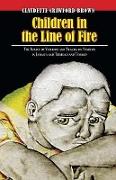- Start
- Children in the Line of Fire
Children in the Line of Fire
Angebote / Angebote:
The title Children in the Line of Fire emerged from a series of annual lectures given by the author entitled Violence and the Jamaican Child prepared for an undergraduate course on Caribbean Social Problems at the University of the West Indies, Mona Campus, between 2002 and 2005. The title underlines the fact that children in Jamaica are not just caught up in the literal cross hairs of guns and other forms of violence, but are figuratively in the line of fire from all of the major systems that make up the fabric of the society, namely from the macro (societal) perspective, the mezzo (community) perspective, as well as the micro (individual and family) perspective. The book argues that children, who are often described as soft targets in the ongoing crossfire involving various warring factions and systems, are some of the most serious casualties of the ongoing violence, and opines that, as a developing country aspiring to move into the twenty-first century, the entire Jamaican society and, by extension, Caribbean society, must be made to understand its role (in the short-term) in the protection of our children. At the same time, it suggests that in the medium and long term there must be a concerted and committed effort to understand the nature of the violence against children in all its dimensions so that its effects on children can be reduced and eventually eliminated in order to protect and safeguard our society s future. (For the case studies mentioned in the book, all names have been changed to protect the individuals, and place names are referred to as regions only.) This book sets out in a detailed and systematic yet non-sensational manner the effects of violence and trauma in all its forms on children, adolescents and their families. It also sets out a blueprint for what the different sectors of the society must do in order to stem the scourge of violence sweeping across the islands of the Caribbean, consuming the most vulnerable sectors of our societies and the region s future, our children. The arguments put forward in the book suggest that Jamaican society and by extension the Caribbean has been inattentive to the impact of violence and other social problems on the mental health of its children. If one assumes that an important criterion for measuring a country s development is its ability to protect its most vulnerable, the author opines that the country and the region are in danger of being in a state of persistent underdevelopment a condition which the region can avoid with sound prevention and intervention policies. A nation that cannot protect its children is a nation that is in trouble, and one that can never truly be said to have developed, regardless of the economic indicators that may say otherwise. The purpose of this book therefore is not just to examine why there is so much violence against children but also to examine the factors that create obstacles to the children s protection. The uniqueness of this book stems from the fact that it provides the reader with basic, easily readable information. This information ranges from the anatomy of violence that is, the types of violence affecting children and families, the number of children and families affected to the causes of the violence, how it develops, and how children become violent adults. Other issues discussed include the motives behind the violent acts and the issues surrounding the violence that make the Jamaican situation unique. The book also addresses the most frequently asked questions about violence affecting children, such as what are the underlying community and societal issues fuelling violence against children and their families.
Folgt in ca. 15 Arbeitstagen
